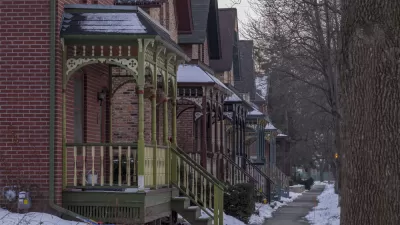Minneapolis combines prosperity with plentiful affordable housing, an increasing rarity. Geographical factors play a role, but longstanding "fiscal equalization" policies may make the difference.

Minneapolis offers mobility and career opportunities that belie its affordable housing prices. Derek Thompson puts forward "fiscal equalization," a set of laws dating from the 1970s and unique in the U.S., as prime cause of that success. The policies require "all of the region’s local governments—in Minneapolis and St. Paul and throughout their ring of suburbs—to contribute almost half of the growth in their commercial tax revenues to a regional pool, from which the money would be distributed to tax-poor areas."
On top of this public-minded redistribution, the Twin Cities benefits from its status as a regional hub, drawing talent into the metro area without suffering an outflow of workers to larger cities. Minneapolis also has no shortage of land potential for expansion. A strong, affordable economy is the result.
But that might not be the full story. Another of Minneapolis' developmental "benefits" is its demographic homogeneity. Like social success stories in northern Europe (and unlike New York, Los Angeles, Chicago) the Twin Cities has never tackled significant racial challenges. As minorities migrate into the historically white region, whether a Minneapolis miracle can prevail is up for debate.
FULL STORY: The Miracle of Minneapolis

Planetizen Federal Action Tracker
A weekly monitor of how Trump’s orders and actions are impacting planners and planning in America.

Restaurant Patios Were a Pandemic Win — Why Were They so Hard to Keep?
Social distancing requirements and changes in travel patterns prompted cities to pilot new uses for street and sidewalk space. Then it got complicated.

Maui's Vacation Rental Debate Turns Ugly
Verbal attacks, misinformation campaigns and fistfights plague a high-stakes debate to convert thousands of vacation rentals into long-term housing.

In California Battle of Housing vs. Environment, Housing Just Won
A new state law significantly limits the power of CEQA, an environmental review law that served as a powerful tool for blocking new development.

Boulder Eliminates Parking Minimums Citywide
Officials estimate the cost of building a single underground parking space at up to $100,000.

Orange County, Florida Adopts Largest US “Sprawl Repair” Code
The ‘Orange Code’ seeks to rectify decades of sprawl-inducing, car-oriented development.
Urban Design for Planners 1: Software Tools
This six-course series explores essential urban design concepts using open source software and equips planners with the tools they need to participate fully in the urban design process.
Planning for Universal Design
Learn the tools for implementing Universal Design in planning regulations.
Heyer Gruel & Associates PA
JM Goldson LLC
Custer County Colorado
City of Camden Redevelopment Agency
City of Astoria
Transportation Research & Education Center (TREC) at Portland State University
Camden Redevelopment Agency
City of Claremont
Municipality of Princeton (NJ)





























